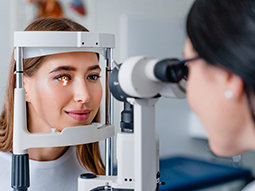The cornea is the outermost layer of the eye. This clear layer of tissue looks like a smooth, dome-shaped piece of glass. By blocking irritating debris and controlling the way light enters the eye, your cornea helps to protect your eyes and focus your vision. The cornea is resilient and can typically heal from minor abrasions. However, major corneal damage can result in a corneal scar.
These scars can be caused by improper use of contact lenses, deep scratches, lacerations, burns, and some diseases like shingles and syphilis. After major damage, clear corneal tissue may be replaced by scar tissue or become occluded by new blood vessels (a problem called neovascularization). These can impair your vision.
If you think you may be suffering from corneal scarring, our ophthalmology team is here to help. Our expert physicians care about keeping your eyes healthy and your vision clear.
What are the symptoms?
Corneal scars can be extremely painful, but we are here to help. Common symptoms include:
- Pain
- Blurred vision
- A burning or scratching sensation in your eye
- Feeling like something is in your eye
- Sensitivity to light
- Red eyes
- Eyelid swelling
- Excessive tearing
How is it diagnosed?
Diagnostic tests for corneal scars are completed in an outpatient setting. Your ophthalmologist will first talk with you about recent eye injuries, symptoms, and medical history.
Next, your ophthalmologist will conduct an eye exam. During the exam, he or she will look for abrasions and irritating debris that may be caught beneath your eyelids. He or she may use magnifying tools, such as a slit lamp or ophthalmoscope, to get a better view of your eye. Your doctor may also use a painless process called a fluorescein eye stain, in which dyed eye drops and a blue light are used to better visualize your cornea.
How is corneal scarring treated?
Your ophthalmologist will work with you to find the most effective treatment for your condition, taking into consideration the severity of your scarring as well as other factors. Treatment options may include:
- Laser surgery, in which UV light is used to treat scarring
- Corneal transplant surgery, in which the damaged portion of the cornea is replaced with donated tissue
- Artificial cornea, in which the damaged portion of the cornea is replaced by a combination of donor tissue and synthetic material
Our providers

Expert ophthalmology care
Getting the care you need starts with seeing one of our ophthalmologists.









